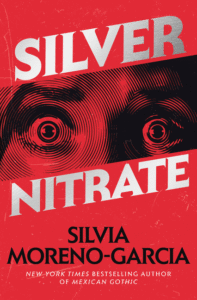
Colson Whitehead’s Crook Manifesto, Patrick deWitt’s The Librarianist, Kate Zambreno’s The Light Room, and Silvia Moreno-Garcia’s Silver Nitrate all feature among the Best Reviewed Books of the Month.
1. Crook Manifesto by Colson Whitehead
(Doubleday)
13 Rave • 8 Positive • 4 Mixed • 1 Pan
Read an interview with Colson Whitehead here
“Both deceptively substantive and sneakily funny, a wise journey through Harlem days and nights as lived by Ray Carney, a conscientious furniture salesman and family man who happens to run a little crooked … Whitehead has always had a sharp instinct for the workings of culture … Whitehead’s New York of the ‘70s is a fully realized universe down to the most meticulous details, from the constant sirens and bodega drug fronts to a sweltering, abandoned biscuit factory … A…reminder, as if we still needed one, that crime fiction can be great literature. These books are as resonant and finely observed as anything Whitehead has written.”
–Chris Vognar (The Los Angeles Times)
2. After the Funeral by Tessa Hadley
(Knopf)
14 Rave • 6 Positive
Read an interview with Tessa Hadley here
“This new collection is a great introduction to her work and for those of us already familiar with Hadley, it’s a great addition. Throughout the collection, Hadley spins out character studies of (mostly) women at odds with themselves, their partners, their families, or life in general … Hadley does a wonderful job of weaving past and present together as the sisters are forced to confront their memories and relationships. And, of course, there are those moments of shining prose … Rife with deft and often beautiful prose, and astute but compassionate characterization, this is a wonderful collection.”
–Yvonne C. Garrett (The Brooklyn Rail)
3. Nothing Special by Nicole Flattery
(Bloomsbury)
4 Rave • 10 Positive • 3 Mixed
Read an excerpt from Nothing Special here
“Exquisitely disorienting … The book is driven by a kind of respiratory imagining, a panting projection that sustains both Mae and the story. She subjects her world and the people who populate it to a ravenous metamorphosing … Some might find the plot’s relentless dissociation a decelerator, but I found it brave and effective: Flattery remains so loyal to the physics of her character’s struggles, to the struggle of storytelling itself, that she is willing to risk allowing the less committed reader to wander off. The point of this novel is not illumination; it’s almost an accident that we get to know Mae at all. Instead the novel captures, in gorgeous prose, the happy and unhappy coincidences that allow us to fall into knowing, those unexpected snags that trip us into ourselves … A revelation that is also distinctly anti-revelation, by a writer whose withholding is as vivid as her bestowing, who shows a story for what it is—something real, something fabricated, something to hide in and from, something special, something so utterly unremarkable it’s the only thing that matters.”
–Alice Carrière (The New York Times Book Review)
4. The Librarianist by Patrick deWitt
(Ecco)
5 Rave • 7 Positive • 5 Mixed
Read an excerpt from The Librarianist here
“I think each Patrick deWitt novel is going to be the one that helps everyone fall in love with his writing, but The Librarianist could finally do it … DeWitt’s dialogue moves with the speed and precision of great conversation and its jokes sneak up on you, more like a wisp of wind on your cheek than someone tapping you on the shoulder to tell you something funny … Bright and entertaining from beginning to end.”
–Chris Hewitt (The Star Tribune)

5. Silver Nitrate by Silvia Moreno-Garcia
(Del Rey)
6 Rave • 4 Positive • 1 Mixed
“True to her method, she succeeds here by knowing when to follow the rules of genre storytelling and when to turn them upside down … Several times in Silver Nitrate, a spirit commands, ‘Follow me into the night.’ While the better part of us hopes Montserrat and her compatriots will refuse, there is simply no resisting the dark spells cast by Moreno-Garcia’s characters—nor those so expertly cast over readers by the author herself.”
–Paula L. Woods (The Los Angeles Times)
**
1. Thunderclap: A Memoir of Art and Life & Sudden Death by Laura Cumming
(Scribner)
9 Rave
“Genre-defying … Cumming suggests that we recall the past through pictures … Cumming clearly loves these paintings, and by weaving together vivid evocations of ones that particularly move her with brief biographies of the men and women who painted them, she invites us to share that love … Like all good elegists, Cumming, too, brings the dead to life in the very act of mourning them.”
–Ruth Bernard Yeazell (The New York Times Book Review)
2. Into the Bright Sunshine: Young Hubert Humphrey and the Fight for Civil Rights by Samuel G. Freedman
(Oxford University Press)
5 Rave • 3 Positive
“Riveting … Freedman tells a surprising and rare history of Black and Jewish Americans fighting against racism and antisemitism, often side by side, in a Northern city before the civil rights era. His brilliant profiles of these local heroes are gripping and, in many ways, the spine of the book … Freedman gives us a dramatic retelling of the backdoor dealings at the convention over the language of a civil rights plank.”
–Khalil Gibran Muhammad (The New York Times Book Review)
3. The Light Room by Kate Zambreno
(Riverhead)
2 Rave • 7 Postive
Read an interview with Kate Zambreno here
“Zambreno’s writing is sharpest, most emotionally alive, when it drills into that interior landscape … Woven into these moments are ruminations on natural history, education and the work of other writers and artists … Readers looking for sturdier insights into what the virus has meant for human history are unlikely to discover them here. But there is comfort and intimacy to be found in the nest Zambreno builds, with lint and marbles and straw, the objects that matter in her tiny universe. Its achievement is as a sustained narrative of noticing.”
–Eleanor Henderson (The New York Times Book Review)
4. Owner of a Lonely Heart by Beth Nguyen
(Scribner)
3 Rave • 5 Positive
Listen to an interview with Beth Nguyen here
“Nguyen is a confident and reliable protagonist even when running up against painful memories, providing readers with enough distance as to almost be objective … Nguyen has made a journey of facing her origins and contending with the limitations of American narratives, and we are lucky to be invited along the way.”
–Mai Tran (The Brooklyn Rain)
5. Tabula Rasa by John McPhee
(Farrar, Straus and Giroux)
5 Rave • 1 Positive
“A charming, breezy collection of reminiscences about projects that didn’t make it, ideas that never got fully baked, research never written up, either because the subject died or because McPhee, who was born in 1931, lost interest along the way … Few of the subjects discussed in Tabula Rasa call out for the longform treatment; McPhee’s instincts (and editors) steered him well. But there are still pleasures to be had in these 50 short chapters. Minor league McPhee is still major league writing. It’s not faint praise to say he is still more pleasingly consistent than any other writer working. There is never a dud metaphor, never a cliché … He still has stories to tell. Maybe they’re just not the ones he had the good sense to let go.”
–Mark Oppenheimer (The Washington Post)

